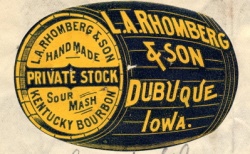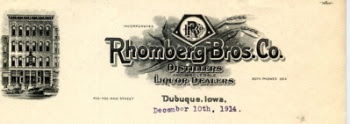When Franz “Frank” Rhomberg arrived in the United States in 1889, he headed directly to Dubuque, Iowa, where other members of the Rhomberg clan of Dornbirn, Austria, had settled years earlier. Among them was a Rhomberg whose reputation had been tarnished 13 years earlier in a headline-making scandal over the distiller’s cheating on taxes from making whiskey. Undeterred by this family disgrace, Frank, shown here, and other Rhombergs earned straight reputations in the liquor trade and were recognized as eminent citizens of Dubuque.
 What initially drew the Rhombergs to Dubuque goes unexplained. It may have been the city’s heavily German Catholic character. An internet site on the diaspora of Dornbirn residents lists three towns, two in Germany and “Dubuque” with an asterisk and “U.S.” Among the first Rhombergs to settle in Dubuque was Joseph, who arrived in 1854. Shown here, this immigrant prospered right from the beginning. Within a decade he had built and operated a distillery that boasted sixteen fermenting tubs, each with a capacity of 300 barrels. When working at full capacity, Joseph’s distillery could mash 1,000 bushels of grain a day.
What initially drew the Rhombergs to Dubuque goes unexplained. It may have been the city’s heavily German Catholic character. An internet site on the diaspora of Dornbirn residents lists three towns, two in Germany and “Dubuque” with an asterisk and “U.S.” Among the first Rhombergs to settle in Dubuque was Joseph, who arrived in 1854. Shown here, this immigrant prospered right from the beginning. Within a decade he had built and operated a distillery that boasted sixteen fermenting tubs, each with a capacity of 300 barrels. When working at full capacity, Joseph’s distillery could mash 1,000 bushels of grain a day.
Unfortunately, Joseph apparently had a propensity to cheat. In 1876 the U.S. Government sued the J.A. Rhomberg Company for $755,000, claiming that Joseph’s enterprise had distilled 9,000 to 10,000 barrels of whiskey upon which it had paid no revenue. The Rhomberg distillery was seized. The story made headline news all over Iowa and well beyond. Claiming innocence Joseph fought the charges vigorously in the courts. The United State Circuit Court in Des Moines, however, ultimately found him guilty and fined him $103,000 (equivalent to $2.8 million today). The Commissioner of Internal Revenue, Green B. Raum, told reporters: “There is no doubt as to the justice of the government’s contentions.” Joseph subsequently turned the distillery into a flour mill.
Still rich from investments in the railway industry and real estate in Iowa and Texas, Joseph sought to redeem his reputation and the Rhomberg name by gifts to the community. He designated a 95 acre parcel of land for a public park that eventually would bear his name. On a street leading to the park, Joseph planted and cared for a line of towering elm trees. When drought threatened, he is said to personally have watered the trees from a specially constructed cart pulled by his horse and buggy. Joseph also announced plans to use several hundred acres he owned four miles north of Dubuque as a vacation resort for the working classes to be called “Lakeview." Many in the city were willing to believe Joseph innocent.
 Meanwhile a second family member, was forging his own way in Dubuque’s liquor
Meanwhile a second family member, was forging his own way in Dubuque’s liquor
trade. He was Libertat A. Rhomberg who had established the wholesale wine and liquor firm of L.A. Rhomberg & Bro. in 1864. This company about 1880 became Jaeger and Rhomberg when Libertat joined with his brother-in-law Adam Jaeger in a wholesale house, shown here, located at 453-465 Main Street. [See post on Jaeger July 6, 2019.]
In 1889 Liberat left this partnership and opened his own wholesale liquor business at 531 Main. Two years later his son, L.A. Rhomberg Jr., known as “Ollie,” joined the company. It subsequently was renamed L.A. Rhomberg and Son. These Rhombergs featured a variety of whiskey brands, including “Rhomberg's Private Stock,” “Beaver Run,” ”L.A. Rhomberg's Sour Mash,” “Silver Spring,” “Rhomberg Club,” and “The Celebrated Pride,” The senior Rhomberg retired about 1900 and Ollie, shown here, kept the liquor house operating until 1906.
Meanwhile Frank Rhomberg had moved temporarily to St. Paul, Minnesota, where he worked two years in a furniture store owned by a relative. About 1891, he moved back to Dubuque and like other Rhombergs was drawn to the liquor trade, working for his uncle, Libertat, as a traveling salesman. After nine years at that occupation, when apparently it became clear to Frank that Ollie, not he, would be the inheritor of L.A. Rhomberg Company, he determined to strike out on his own.
About 1900 Frank formed a partnership with his younger sibling Alphonse J. called the Rhomberg Brothers Company, a wholesale liquor house. They were not distillers but “rectifiers” who blended whiskey from manufacturers in the Midwest and beyond. Dubuque’s position as a railroad center made it possible for the brothers to access stocks even from a distance. They featured a number of proprietary brands, including “Key City Club” a reference to Dubuque as a key gateway to the pioneer West. As shown here, the brand was sold as both sour mash bourbon and straight whiskey.
 Other Rhomberg Brothers brands were “Thornwick Rye,” “Thornwick High Grade Rye,” “Thornwick Blend,” “Ben Hur Whiskey,” “Rhomberg Pride,” and “Ben Hur Whiskey Blend.” Documents indicate the brothers registered the trademarks for both Thornwick and Ben Hur in 1905. They also issued advertising shot glasses for those labels. The shots would have been given to the saloons, restaurants and hotels carrying their liquor.
Other Rhomberg Brothers brands were “Thornwick Rye,” “Thornwick High Grade Rye,” “Thornwick Blend,” “Ben Hur Whiskey,” “Rhomberg Pride,” and “Ben Hur Whiskey Blend.” Documents indicate the brothers registered the trademarks for both Thornwick and Ben Hur in 1905. They also issued advertising shot glasses for those labels. The shots would have been given to the saloons, restaurants and hotels carrying their liquor.
 Although at the repeal of National Prohibition the U.S. Congress mandated that fancy “back of the bar” bottles were no longer legal alcohol containers, the result of their pre-Prohibition rampant misuse, whiskey wholesalers of the Rhomberg’s era were almost obliged to offer them as give-away items to customers. Frank and Alphonse were no exceptions. Shown here are two of their offerings advertising Key City Club Whiskey. Perhaps the most unusual item gifted by the
Although at the repeal of National Prohibition the U.S. Congress mandated that fancy “back of the bar” bottles were no longer legal alcohol containers, the result of their pre-Prohibition rampant misuse, whiskey wholesalers of the Rhomberg’s era were almost obliged to offer them as give-away items to customers. Frank and Alphonse were no exceptions. Shown here are two of their offerings advertising Key City Club Whiskey. Perhaps the most unusual item gifted by the
Rhombergs was a cigar case advertising “Rhomberg Pride” whiskey.
 As Frank was maintaining the Rhomberg liquor dynasty in Dubuque, he was also having a personal life. At age 25, he married a local woman, Mary H, Altman, 23. They would have two children before Mary’s untimely death at 38 in 1907. Three years later Frank remarried. His bride was Minnie Bertha Kruse. The couple would have an additional three children. Frank housed his family in a prominent Queen Anne architectural home at 2500 Broadway.
As Frank was maintaining the Rhomberg liquor dynasty in Dubuque, he was also having a personal life. At age 25, he married a local woman, Mary H, Altman, 23. They would have two children before Mary’s untimely death at 38 in 1907. Three years later Frank remarried. His bride was Minnie Bertha Kruse. The couple would have an additional three children. Frank housed his family in a prominent Queen Anne architectural home at 2500 Broadway.
When Iowa in 1916 passed laws banning all alcohol sales, Frank was quick to pivot to other enterprises. He founded and became president and CEO of the Dubuque Tanning and Robe Company, an organization that later became the Rhomberg Fur Company, an enterprise that recently celebrated 100 years in business. Frank died in 1919 and was buried in Dubuque’s Catholic Mt. Calvary Cemetery where many of the Rhomberg clan are interred.
Beginning with Joseph in 1864 and ending with statewide prohibition, the Rhombergs from Dornbirn had been involved in making and selling whiskey in Dubuque for more than half a century. In their efforts they successfully unlocked the doors to wealth and recognition in the “Key City.” Today Rhomberg Street in Dubuque keeps alive the memory of this distilling dynasty.
Notes: Although this post relied on a number of sources, an essential resource was the Encyclopedia Dubuque that contained biographical material on each of the Rhomberg whiskey men. This excellent online research tool is affiliated with the Local History Network of the State Historical Society of Iowa, and the Iowa Museum Association. To quote a CNN authority: "Encyclopedia Dubuque is the online authority for all things Dubuque, written by the people who know the city best.”












No comments:
Post a Comment